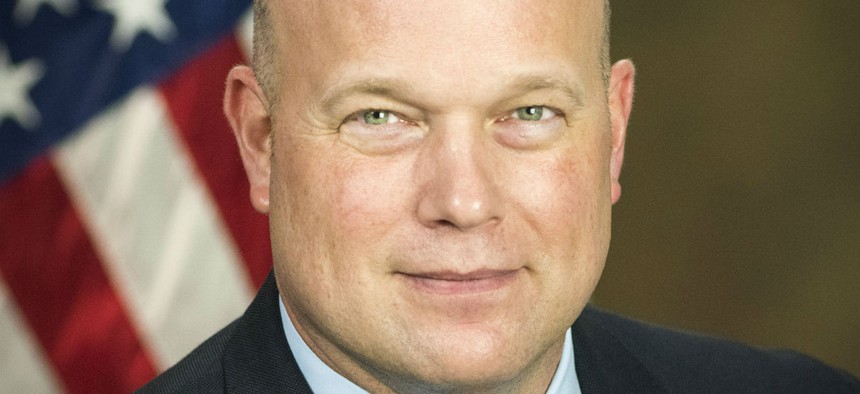
Trump named Matthew Whitaker as acting attorney general after asking Jeff Sessions to resign. Justice Department
Here's Why Some Are Questioning the Constitutionality of Trump's New Acting AG
Current law allows the appointment, but at least one Supreme Court justice appears to question its validity.
While President Trump clearly acted within his authority when appointing Matthew Whitaker as acting attorney general, some legal scholars are criticizing the move by questioning the constitutionality of the underlying law.
Whitaker, who replaced Jeff Sessions as head of the Justice Department on Wednesday after Trump asked for Sessions’ resignation, has the full force of the office despite his title. Trump named him acting attorney general under a provision of the 1998 Federal Vacancies Reform Act that enables the president to name a senior officer at an agency to serve in a temporary capacity in what is typically a Senate-confirmed position. Whitaker previously served as Sessions’ chief of staff, a non-Senate confirmed position.
Some legal scholars have suggested that the Appointments Clause of the Constitution prohibits a non-Senate confirmed political appointee from acting as a “principal officer.” Such an appointment serves as a presidential workaround to the advice and consent role afforded to the Senate, those individuals argue. By agreeing to resign, Sessions at least appeared to eliminate another potentially problematic provision of the vacancies law, which may limit the president’s latitude in naming an acting official when the vacancy resulted from a firing.
In a New York Times op-ed, law professor and former acting solicitor general Neal Katyal and attorney George Conway (husband to White House Counselor Kellyanne Conway) called Trump’s use of the vacancies law in this case flawed and Whitaker’s appointment unconstitutional.
“It defies one of the one of the explicit checks and balances set out in the Constitution, a provision designed to protect us all against the centralization of government power,” they wrote. Because Whitaker has not gone through a confirmation process, they added, “there has been no mechanism for scrutinizing whether he has the character and ability to evenhandedly enforce the law in such a position of grave responsibility.”
The Constitution and legal precedent define a “principal officer” as anyone who reports directly to the president. All other appointed personnel are considered “inferior officers.” In an opinion issued by Justice’s Office of Legal Counsel under President George W. Bush, anyone serving in an acting capacity—even if it is in a role typically considered a “principal” position—is automatically an inferior officer. The Office of Legal Counsel’s argument was rooted in the temporary nature of the acting official’s role.
Paul Light, a professor of public service at New York University, agreed with that line of thinking and noted the Federal Vacancies Reform Act traces its roots back to a law Congress passed in 1789.
“People leave, people die, people get indicted,” Light said. “Congress always understood that the president needed a bit of freedom to keep government working, but not for indefinite periods. Hence, the time limits on acting appointments.”
In National Labor Relations Board v. SW General, however, Supreme Court Justice Clarence Thomas wrote an opinion accompanying the majority opinion that found NLRB’s acting general counsel was a principal officer whose position required Senate confirmation, and all of his decisions were therefore void. Thomas went further than his colleagues in pointing to a potential unconstitutional provision in the vacancies law.
“Appointing principal officers under the [Federal Vacancies Reform Act], however, raises grave constitutional concerns because the Appointments Clause forbids the president to appoint principal officers without the advice and consent of the Senate,” Thomas wrote.
John Bies, former deputy assistant attorney general in Justice’s Office of Legal Counsel, wrote in a Lawfare piece that Thomas' opinion takes a more realistic approach than the Office of Legal Counsel in determining whether an acting official should be considered temporary “when it can result in exercise of all of the office’s duties over a long period of time.” Whitaker can serve as acting AG for 210 days, though the clock resets once Trump nominates someone to serve in the position permanently. Bies called the constitutionality of the Federal Vacancies Reform Act for the appointment of a non-Senate confirmed official into a principal role an “open question,” and said he will almost certainly take action that gives someone standing to “litigate the validity of his appointment.”
Thomas also suggested that the judicial branch will have the final word on a situation such as Whitaker’s.
“Courts inevitably will be called upon to determine whether the Constitution permits the appointment of principal officers pursuant to the [Vacancies Act] without Senate confirmation,” Thomas wrote.







